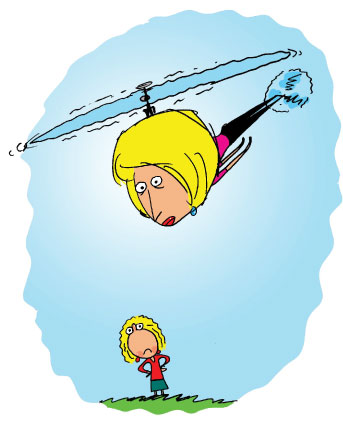
Helicopter parents who hover over their kids are the most popular of punching bags. Remember the mom who sued her 4-year-old's $19,000-a-year preschool because the kid was spending time with the 2-year-olds and thus having her chances of getting into Harvard ruined?
You might figure I'd join the chorus of shame, seeing as I founded Free-Range Kids, the movement dedicated to giving kids more freedom, and am now president of Let Grow, a new nonprofit whose aim is overthrowing overprotection.
And OK, you'd be right. Hard to resist a little shaming of that particular mom. She didn't even realize that mixed-age play is the greatest thing for kids since the invention of the sippy cup. Her daughter, lording over all those 2-year-olds, could have learned everything she needed to rule Silicon Valley when she's 28.
But in general, beating up on moms and dads desperately trying to do the best by their kids is pointless and even kind of cruel, because in truth, they have very little choice. Ours is a culture that forces parents to micromanage.
Even if you're a parent who wants your kids to walk to school on their own or play in the park till the streetlights come on, there are fewer and fewer kids out there for them to do this with. In my day — which shall go un-pinpointed — the majority of kids walked to school. Today it's 13 percent nationally. In New York, where I live, each morning the school playgrounds are full of parents dropping off kids. A generation ago, kids would have been mortified to be chaperoned. Meantime, we've all heard of parents who've been arrested for letting their kids go outside on their own. Once it is no longer the norm to let kids do anything unsupervised, it's a vicious circle. Parents helicopter because it's hard (and sometimes illegal) not to.
•
After I wrote about letting my 9-year-old ride the subway alone, I went on talk show after talk show defending my belief that kids can do some things — even some slightly confusing or scary things — on their own. Many disagreed. They still do.
But we are living in the safest era in human history, according to Harvard's Steven Pinker (a professor that lady's 4-year-old will never have!). New York's murder rate for 2017 is on track to hit a historic low. So why supervise our offspring as if we're living in the end times? Kids need some independence — and even a little risk.
A study on risky play published in Evolutionary Psychology found that kids "dose" themselves with the level of risk they can handle — for instance, by climbing ever higher on the monkey bars. The thrill they feel is their reward for being brave. The more kids tiptoe to beyond their comfort level the braver they become. Facing your fears (as anyone in therapy can attest) has a sort of "anti-phobic effect."
Children deprived of the chance to face those fears because an adult is always standing by to "help" them can end up more anxious. What's more, with constant adult assistance and intervention, they don't even get to organize their own games or solve their own spats. They never get lost and have to find their way home, scared but then triumphant. So all these coping skills get less developed.
And it could be argued that this is why today's college students are having a harder time than earlier generations getting along on their own. In just five years, 2011 to 2016, the number of undergrads reporting "overwhelming anxiety" jumped from 50 percent to 62 percent. Having been protected from so many risks and discomforts as children, they are hypersensitive to these at college.
Hence perhaps the demand for a "safe space" when someone they dislike comes to speak. It's not that these students are literally not safe. But it may feel that way because something is making them anxious and no one is stopping it, the way adults always have till now.
The antidote is simple: Make it easier for adults to give kids back their freedom. Don't arrest or shame parents who let their kids do things on their own. Don't exaggerate the dangers and difficulties of childhood. Don't say "What if something bad happens?" and then use that made-up, what-if, unlikely scenario as if it were a real, immediate and probable risk.
Put simply: Don't step in when you can step back and let your kids go ... and grow.
Comment by clicking here.


 Contact The Editor
Contact The Editor
 Articles By This Author
Articles By This Author